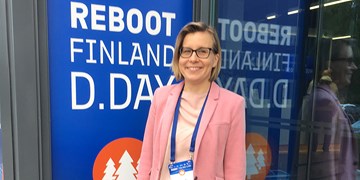Bioeconomy industry is looking for partners in data utilisation
The bioeconomy is becoming digital through intelligent management of biomass flows, utilisation of data and new kinds of networks and platforms. This is how Jussi Manninen from VTT predicted the future at the D Day Bioeconomy event (on 5 September 2017), which brought together operators in the bioeconomy and digital business. Tekes' Jarmo Heinonen, who hosted the event, viewed partnerships between different companies and business areas important when realising the potential of digitalisation in the bioeconomy.
Utilisation of data emerged in the companies' presentations as a common denominator across various areas of the bioeconomy. Jyväskylä Energia, for example, is seeking new partners for its Pisara water supply concept in the area of artificial intelligence and in the more efficient data analysis it enables. At the same time, new data would be needed, for example, regarding bacteria content of water or in infrastructure – which creates need alsofor novel sensor technology.
Valmet described its efforts to create a new service ecosystem relating to data utilisation together with new partners. The company sees potential also for partners in the startup phase, for example, in utilising virtual reality and added reality in services based on data.
In agrotechnology and food production, Rasioagro presented its "Internet of Farming" concept. In this area, too, there is need for more efficient data analysis and for artificial intelligence solutions for utilising data collected about the food chain. Sampo-Rosenlew sees industrial internet solutions in the future as becoming an integral part of combine harvesters – with the goal even of autonomous harvesters. This development will give rise to wide range of opportunities for future partners.
It was discussed that new partners need to understand also the customers of the bioeconomy sector in question, so that solutions can be created genuinely together while understanding the customer's process. On the other hand, openness was sought in creating a joint way of working. Startups in particular can bring new ways of working as well as agility and speed to joint development work. Likewise, the references of partner companies and international contacts were seen as an important factor strengthening the companies' own networks.
Utilisation of data and services created on the basis of this will move companies in the bioeconomy towards operating models of the digital world. Pekka Sivonen from Tekes, emphasised how industry will be moving from business models based on a linear value chain towards platform economy business models. In these models, digitality lies at the core and through the cooperation and interaction of multiple parties it will be possible to achieve extensive mutual business benefits.
In addition to business, there will also be changes in research and development. VTT's Manninen pointed out that digital opportunities and artificial intelligence, for example, will change the way in which we conduct research and development work and how we create new business possibilities in the future.
- Presentations given at the D.Day Bioeconomy event
- Tekes' funding for developing business and network-like research and development
See also
- Luke and VTT: Bittejä ja biomassaa – Tiekartta digitalisaation vauhdittamaan biotalouteen, 2017 (in Finnish) (Bytes and biomass – roadmap to the digi-boosted bioeconomy)
